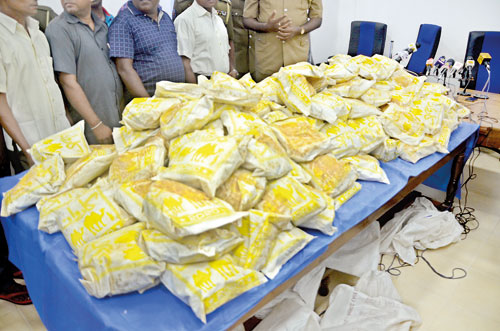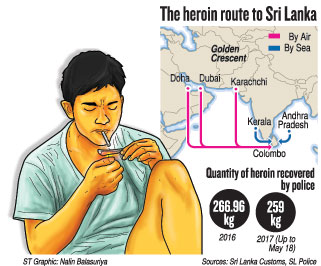News
Lanka’s drug busters gaining ground in battle against heroin smugglers
- Last week’s ill fated PNB op was led by an officer who had made several big raids
- Authorities say much of the heroin now being smuggled into the country is for local consumption
- This year’s seized heroin is set to surpass last year’s amount

The biggest heroin bust so far: 198 kg seized in Muthupanthiya island off Chilaw. Pic by Augustin Fernando
Last week’s ambush of officers from the Police Narcotics Bureau (PNB) came as authorities were making significant strides in their battle against local and foreign drug traffickers, authorities claim.
The smuggling of heroin is of primary concern for authorities given its status as a “hard drug.” According to statistics from Police Headquarters, from January 1 to May 18 this year, the police alone had seized 259 kilograms (kg) of heroin. Accordingly, it is surmised that the quantity of heroin seized this year will surpass the 266.96 kg seized last year.
The quantity of heroin seized so far for this year rose dramatically by the discovery of 198 kg of the drug from Muthupanthiya island off Chilaw on May 11 by Puttalam police. The detection was the biggest heroin bust in Sri Lanka in the recent past. The seized heroin stock is estimated to have a street value in excess of Rs.2 billion. The main suspect in this case is in police custody.
The successful raid came two days after a group of officers from the PNB were lured into an ambush in Piliyandala by suspected drug traffickers, resulting in the death of one PMB officer and serious injuries to two others. An 11-year-old girl, who was among four civilian bystanders shot and injured in the incident, also died on Friday while being treated at the Intensive Care Unit (ICU) of the Colombo National Hospital.
Inspector (IP) Neomal Rangajeewa, who led the ill-fated PNB team that was ambushed and who is still in the Intensive Care Unit, was one of the agency’s most successful officers, said Deputy Inspector General (DIG) (Crimes) and Police Spokesman Priyantha Jayakody. According to DIG Jayakody, IP Rangajeewa had seized 500 grams or more of heroin on 28 occasions as a narcotics officer. It is estimated that he alone had helped seize about half a tonne of heroin. Four of the defendants prosecuted in cases regarding these investigations had received life sentences while other cases are pending in courts. The joint naval-police operation which led to the seizure of 111 kg of heroin from a multi-day fishing trawler last year and the arrest of 14 foreign nationals, was also possible due to a tip-off given to the IP.
Given his reputation as a drug buster, police strongly suspect that drug traffickers had set up the ambush with the primary aim of murdering IP Rangajeewa.
From 2000 to this year so far, 104 people, including 20 foreigners, were given life sentences by courts for drug smuggling in 97 investigations initiated by the PNB. Furthermore, 16 defendants who were found guilty had been sentenced to death. They include a woman, a Nepali national and notorious drug kingpin “Wele Sudha.”
Aside from the large heroin consignment detected in Chilaw, there have been several other significant heroin seizures last week and this week. On May 12, a Sri Lanka Coast Guard vessel detected 9 kg of heroin from a package off the Kankasanthurai coast and 3kg of heroin from a garbage dump on D.R. Wijewardena Mawatha in Colombo. On May 17, a suspect was arrested with 1.5kg of heroin from Mundalama.
 Unlike in the past, much of the heroin being smuggled into the country is for local consumption as demand for the drug is on the rise. According to the 2016 Annual Report of the International Narcotics Control Board (INCB) under the United Nations “Trafficking of heroin from South-West Asia to India and then to Sri Lanka, Maldives and countries in Western Europe was identified by the Narcotics Control Bureau of India as a major trafficking trend.”
Unlike in the past, much of the heroin being smuggled into the country is for local consumption as demand for the drug is on the rise. According to the 2016 Annual Report of the International Narcotics Control Board (INCB) under the United Nations “Trafficking of heroin from South-West Asia to India and then to Sri Lanka, Maldives and countries in Western Europe was identified by the Narcotics Control Bureau of India as a major trafficking trend.”
According to law enforcement officials, Sri Lanka gets most of its heroin from the so-called “Golden Crescent” region which overlaps Iran, Pakistan and Afghanistan. The drugs are smuggled across the borders of these countries into India before being transported via sea to the Sri Lankan coast. Additionally, heroin is also coming to the country from the Western desert regions of India, they further disclosed.
Nevertheless, due to the increase in major detection of drugs such as heroin and cocaine in recent years, Sri Lanka is no longer internationally considered a “soft” transit point or distribution hub for narcotics, DIG Jayakody noted. The major raids are due to the high standard of anti-narcotics enforcement and increased cooperation among agencies such as the PNB, Customs, Excise Department and the Sri Lanka Navy, he stressed.
Meanwhile, heroin is also being smuggled into the country via air by using carriers, mainly from Pakistan. Custom sources disclosed that these carriers are using the Karachi-Dubai-Colombo route or the Karachi-Doha-Colombo route. “They are using Dubai and Doha as transit points given that passengers flying directly from Pakistan to Sri Lanka are subjected to increased scrutiny at the airport,” a senior Customs official told the Sunday Times. In recent weeks, Customs officials at the Bandaranaike International Airport (BIA) had arrested four foreigners – three Pakistanis and an Iranian for possession of heroin. They had used the mentioned routes. The latest arrest was on Wednesday when a Pakistani was arrested at the BIA while trying to smuggle in heroin with an estimated street value of Rs.10 million, hidden in his shoes.
| A first for Lanka: ‘Affluent drug’ methamphetamines seized | |
| In the first such detection of its kind in Sri Lanka, the Excise Department yesterday seized 200 grams of methamphetamines – an expensive illicit drug mostly marketed to young people from affluent families — from the Elakanda area in Wattala, officials said. Two female suspects were taken into custody on charges of possessing the drug. G.N. Hemantha, Head of the Excise Department’s Special Operations Unit told the Sunday Times that the seized consignment has a street value of about Rs.two million. Mr. Hemantha said the suspects, both in their 40s, were trading in jewellery and garments. “They take jewellery to India to be sold and come back with clothes to sell here. We suspect they have been purchasing the drugs in India and smuggling them in when they return with the clothes.” Methamphetamine, known as “Crystal Meth” or “Ice” is a highly addictive illicit drug classified in the same class as cocaine and other potent stimulants. It is mostly used as a recreational or “club drug” and provides a long-lasting euphoric effect on the user. According to medical experts, long term side effects of the drug can include loss of appetite, psychosis including paranoia and hallucinations, aggressive or violent behaviour, breathing problems, significant weight loss and depression. |
| Ecstasy haul: Officers hope suspect’s phone will reveal racket | |
| Excise Department officers are hoping that analysis of the mobile phone of a software engineer who was arrested with over 1600 “Ecstasy” pills this week will yield more details regarding a multi-million rupee drug racket. A team of officers from the Excise Department’s Special Operations Unit arrested the software engineer during a raid in Nugegoda on Monday night. G.N. Hemantha the unit’s Head, told theSunday Times that 1676 ecstasy pills were recovered from the suspect’s possession. When officers raided the home, the suspect had allegedly reset his smartphone in an effort to wipe out all the data from it. “We believe that the phone contains valuable information regarding the workings of this racket and we hope to obtain a court order to send the phone to the Colombo University to see if the data could be recovered,” Mr Hemantha said. It is believed that the suspect had been working with a foreign national based overseas who supplied him the drugs which the software engineer distributed in Sri Lanka. The street value of a single pill is estimated to be over Rs.3000, according to officials. Officers had also recovered an accounts book where the suspect allegedly recorded all his ecstasy sales. This is also by far the single largest stock of ecstasy pills recovered in the country. The previous seizure were between 30-40 pills each. Mr Hemantha observed that young people were being drawn to use the drug believing that it was not addictive and had no side-effects. “This is a total myth. Ecstasy is extremely addictive and there are severe side-effects. We urge young people not to be misled by such false information and to avoid using the drug.” |
| PNB ambush: Little Samadhi loses battle to survive | |
| Last week’s ambush which targeted officers from the Police Narcotics Bureau (PNB) claimed another life on Friday (19) when 11-year-old Samadhi Ransika Pathirana succumbed to her injuries at the Colombo National Hospital. Samadhi, a Grade 6 student at Rathnawali Balika Vidyalaya in Borella, died 10 days after the attack which took place on May 9. She was first admitted to the Kalubowila Teaching Hospital before being transferred to the Intensive Care Unit (ICU) of the National Hospital where she passed away. She never regained consciousness. A resident of Madapatha, Polhena in Piliyandala, she had been waiting along with her siblings at a shop in Piliyandala owned by her father that night when they were hit by stray bullets after gunmen on a motorbike fired on a car carrying PNB officers. According to police, the gunmen had emptied an entire magazine of T56 ammunition in the attack. Some of the bullets struck Samadhi, her 7-year-old sister Senuri, 17-year-old brother Sandeepa and a 29-year-old three-wheeler driver who were all at the shop. Earlier this week Samadhi’s relatives and area residents staged a protest in Piliyandala alleging that authorities were not paying attention to their plight. Police chief Pujith Jayasundara and Justice Minister Wijeyadasa Rajapakshe subsequently visited the children in hospital and assured assistance. Samadhi’s body was brought to her home on Friday evening. While her younger sister has been discharged, her older brother is still receiving treatment. The shooting also claimed the life of 37-year-old Constable Chaminda Abeywickrama attached to the PNB. |

